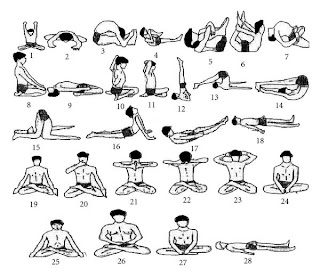With Ha meaning ‘Sun’ and Tha means ‘moon’ Hatha Yoga is commonly translated as the yoga that brings union “of the pairs of Opposite sometimes Hatha Yoga is also translated as ‘Forcefull Yoga’ because it requires lot of physical effort. Hatha Yoga is certainly the yoga that is the best known in the west which is the part reason why so many definitions of Hatha Yoga exists.
In the Indian tradition Hatha
Yoga is one of the four main of Tantra Yoga.Hatha Yoga is the first of all concentrating
on the practice of postures ( Asanas ) and breath control
(Pranayama) to ennerzise the
subtle channels (nadis). Thus one might say Hatha Yoga Concentrates the third
and fourth steps of Asthanga Yoga. The objective of Hatha Yoga is obviously to remove
the obstacles to address the further steps of Pratyahara (sense withdrawal ) Dharana
( concentration ) Dhyana ( meditation ) and Samadhi ( Balance )
Exercising postures in Hatha Yoga
has two essential objectives. The first is that to practice any real meditation
one needs at the least one posture in can be perfectly comfortable for longer period
of time. The more such postures one can master the better the basis of inner meditation
techniques .The second objective of exercising Hatha Yoga is to bring health
and energy to body and mind by opening the nadis. When such exercise are
performed regularly the path of hatha Yoga opened automatically though one
still has to follow further the mere mastering of postures is no objective in
itself though mastering various postures certainly strengthens the power of will
and concentration and the habit of not paying too much attention to information
input by the senses. Thus practicing asanas in Hatha Yoga directly opens the path
to prathahara and Dharana.
The exercise of Pranayma in Hatha
yoga is essential to master ones breathing patterns. If one can master breath then
the mastery of mind is within reach. Though breathing exercise the flow of
prana or vital life forces through the body is regulated. That energy is
certainly needed on the further steps of Hatha Yoga that ultimately leads to Samadhi,
special breathing techniques, in which the flow of breath though both nostrils is
alternated brings balance to the two hemispheres of the brain pranayama in Hatha Yoga also activates the Kudalini energy.
So Hatha Yoga is the very good
place to start on the path of Yoga. Even that is important to realize that if
the first two steps of Asthanga Yoga are
neglected Yama and Niayma Hatha Yoga might not give the desired result even
simple Hatha Yoga exercises should be avoided if you not been properly gone for
the toilet.
Traditional Hatha Yoga consists of:
1. Asanas (postures);2. Shat Karmas (six cleansing
techniques, also known as Shat Kriyas);3. Pranayama (control of breathing with
retention);4. Bandhas (locks) and Mudras (seals) for the regulation of Prana (life-force)
and Kundalini; and5. Samadhi (Union
Type of Hatha Yoga.
Shristi Krama Hatha Yoga :- The practice
stimules growth on all levels in youth, physical,mental,sprirtual. It requires
a youth full and healthy body. The main objective are to improve concentration,
flexibility and energy flow through the nadis.
Siksana Krama Hatha Yoga :- This Hatha Yoga practice aims at
perfection in all asanas and further development from pranayama exercise in to
the control of bandhas and other instruments of yoga
Rakshana Krama Hatha Yoga :- The objective here to maintain health,
which is an ideal practice for the householder yogi. Relaxation is very
important in this practice.
Adhyatimika Krama Hatha Yoga :- Another practice particularly
suited to householder yogis but with a more spiritual objective Hatha Yoga
practice that leads to uncovering and strengthening the connections to the
inside.
Chikitsa kram Hatha Yoga :- Chikitsa means therapy and this
hath Yoga practice thus is a healing practice it is about to regaining balance
on the physical, emotional and spiritual levels in order to remove dysfunctions.
Shakti karma Hatha Yoga :- This Hatha Yoga practice aims mostly
developing shakti which means power it is mostly practiced by Sadhus ( Renunciates
).
Disclaimer For Yoga Exercise:
The yoga exercises depicted above in the line diagrams are only a graphic representation for the understanding of the asanas or exercise. Please do not attempt to practise these without proper guidance from a trained Yoga instructor as these exercises can cause physical disability when done incorrectly.
